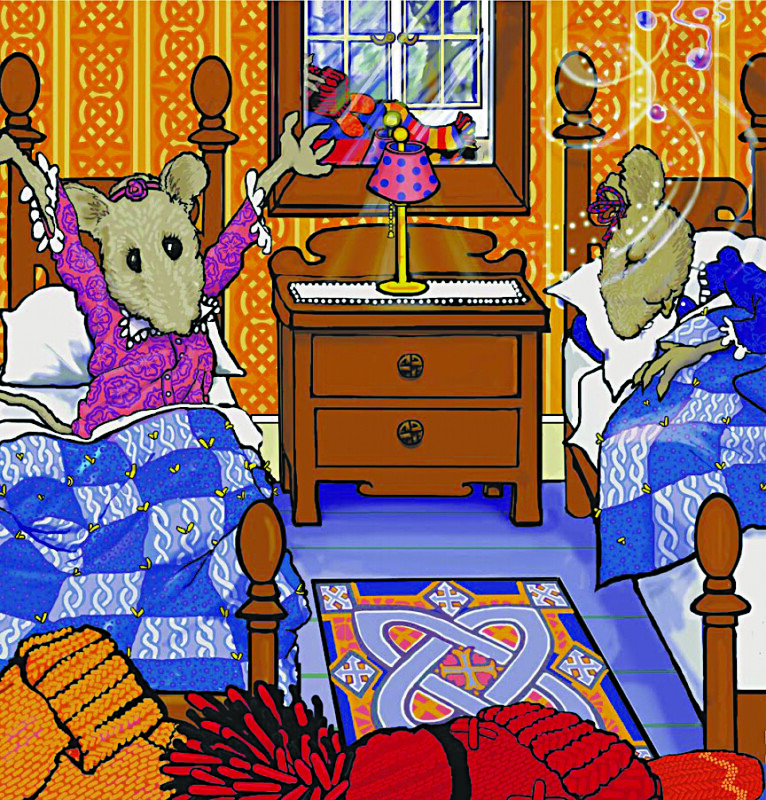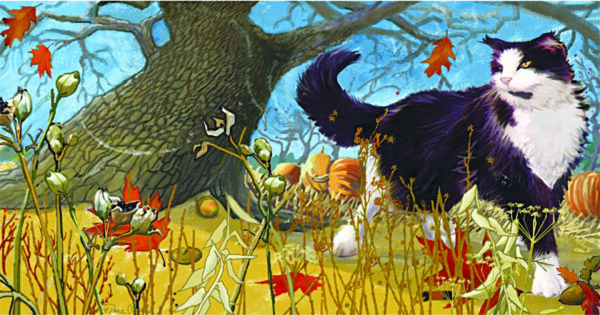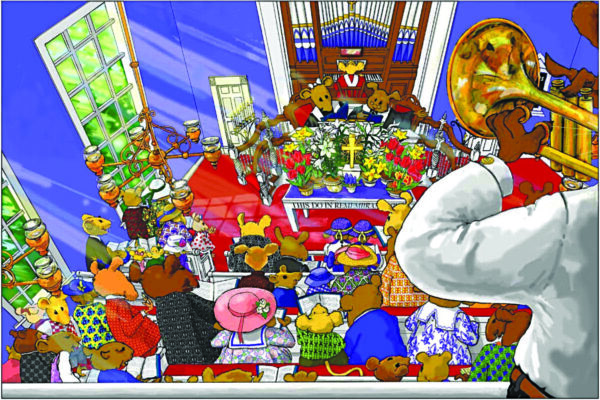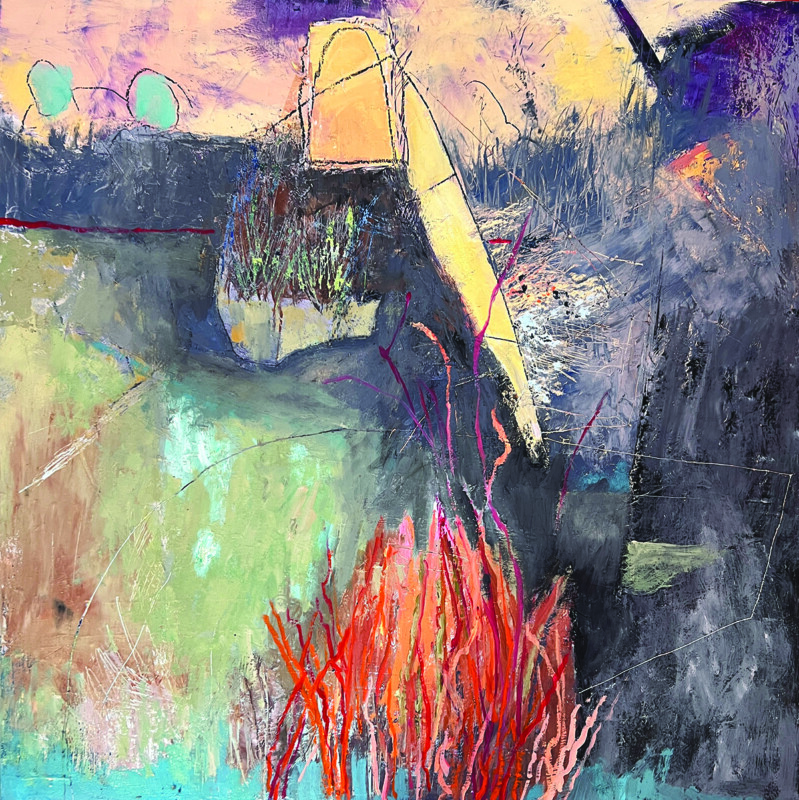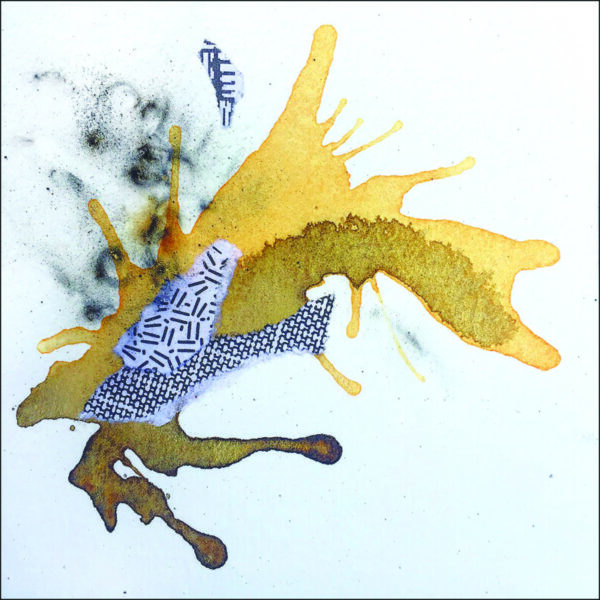The latest from NH’s theater, arts and literary communities
• Molten fun: Online registration for the Andres Institute of Art’s Remote Spring Iron Melt is open now through Saturday, April 30. Traditionally, the public has been invited to the Institute’s studio space to create custom designed iron tiles; participants would scratch their design into a 6-by-6-inch sand mold and coat it with a liquid graphite, then watch as molten iron is poured into their molds on site. For the remote event, participants will pick up a mold from the Institute (106 Brookline Road, Hollis) — pickup dates are Thursdays, April 21 and April 28, and Saturdays, April 23 and April 30, between 10 a.m. and 2 p.m. — and scratch their design at home, then drop off their scratched molds back at the Institute; drop-off dates are the same as pickup dates, plus Thursday, May 5. Designs will be poured at Green Foundry in Maine on Saturday, May 7, and available for pickup on Thursday, May 12, and Saturday, May 14. The cost is $40 per mold, or $30 for AIA members. Visit andresinstitute.org or call 673-7441.
• Make way for … Ja’far?: Twisted: The Untold Story of a Royal Vizier, produced by the Actors Cooperative Theatre, will begin a three-weekend run at the Hatbox Theatre (270 Loudon Road in Concord; hatboxnh.com, 715-2315) on Friday, April 22. The show will run through Sunday, May 8, with shows on Fridays and Saturdays at 7:30 p.m and Sundays at 2 p.m Tickets cost $22 for adults ($19 for seniors and students). The play is described as a comic rif on the 1990s Aladdin story told from the perspective of Ja’far “a well-intentioned and hardworking official from The Kingdom,” according to a press release (which notes that the play contains “adult language, adult situations … drug references, sexual situations and partial nudity”). The musical is written by some of the same people behind parodies like A Very Potter Musical and The Trail to Oregon, the release said.
Sculptors wanted
The City of Concord and the Greater Concord Chamber of Commerce’s Creative Concord Committee are seeking sculptors for the city’s fifth annual “Art on Main” Outdoor Sculpture Exhibition, a year-round outdoor public art exhibit set up in Concord’s downtown. Professional sculptors age 18 and older (with preference for New England-based sculptors) are invited to submit up to two original sculptures for consideration. The selected sculptors will receive a $500 stipend, and their sculptures will be on display and for sale from June 2022 through May 2023 (30 percent commission taken by City of Concord). The deadline for entries is Friday, April 29. To apply, visit concordnhchamber.com/creativeconcord, call 224-2508 or email [email protected].
• Abstract art shown: Twiggs Gallery (254 King St., Boscawen) presents a new exhibit, “Impact! Abstract!,” featuring the work of six local artists, on view now through May 28. The artists include Ann Saunderson, who works in acrylic, mixed media, oil and cold wax and monotype; Daniela Wenzel, who does oil painting, assemblage, ink drawing, driftwood pyrography and improvised quilt-making; Kate Higley, who does printmaking; Ethel Hills, who works in acrylic; and Grace Mattern, who does mixed media collage. “It showcases artists boldly approaching abstraction in completely different ways with a wide variety of media,” Twiggs gallery director Laura Morrison told the Hippo earlier this month. “Most of the artwork in this exhibit is on the smaller side, yet each piece really stands out on its own. It’s very powerful work.” Gallery hours are Thursday through Saturday from 11 a.m. to 4 p.m., and Sunday from noon to 4 p.m. Visit twiggsgallery.wordpress.com or call 975-0015.
• Once trash, now fashion: The Upcycled Fashion Show, presented by Makers Mill and the Governor Wentworth Arts Council, will be held on Saturday, April 23, from 7 to 9 p.m. at Makers Mill (23 Bay St., Wolfeboro). The event invites designers of all ages to create wearable art with at least 75 percent of the materials being recycled, reused or repurposed. “Upcycled fashion is … a great way to experiment artistically and … experiment with style,” featured designer Amelia Bickford told the Hippo last month, adding that the show is “a great opportunity to draw further attention to the tremendous need the world has for recycling and reducing waste.” Tickets for spectators cost $5 in advance and $7 at the door. Visit makersmill.org/blog or call 569-1500.
• Music of love: Symphony New Hampshire presents a concert, “Love’s Dawn,” on Saturday, April 23, from 7:30 to 8:30 p.m. at the Keefe Center for the Arts (117 Elm St., Nashua). The program will feature Claude Debussy’s Petite Suite, Richard Wagner’s Siegfried Idyll and Wolfgang Mozart’s Symphony No. 35 in D major, K.385 “Haffner.” Doors open at 6:15 p.m., and there will be a pre-concert talk at 6:30 p.m. and a post-concert reflection approximately 15 minutes after the concert. Masks and proof of vaccination are required for all attendees. Ticket costs range from $20 to $60 for adults, and from $18 to $55 for seniors age 65 and up. Children are admitted for free with paying adults. Visit symphonynh.org or call 595-9156.
Wild Symphony
New Hampshire native and bestselling author of The Da Vinci Code Dan Brown will join the University of New Hampshire Wind Symphony for the world premiere of the wind ensemble version of his debut classical work Wild Symphony on Sunday, April 24, from 5 to 6:30 p.m., at the university’s Johnson Theatre (30 Academic Way, Durham). The work is based on the musical album, released in conjunction with a corresponding children’s book of the same name, which pairs short poems and illustrations of animals with classical music. Brown will narrate the book while the symphony performs the music. The event is free, but tickets must be reserved in advance. Visit unh.universitytickets.com.
ART
Exhibits
• “IMPACT! ABSTRACT! Exhibition featuring the abstract work of six local artists, including Ann Saunderson, who works in acrylic, mixed media, oil and cold wax and monotype; Daniela Wenzel, who does oil painting, assemblage, ink drawing, driftwood pyrography and improvised quilt-making; Kate Higley, who does printmaking; Ethel Hills, who works in acrylic; and Grace Mattern, who does mixed media collage. Twiggs Gallery (254 King St., Boscawen). On view now through May 28. Gallery hours are Thursday through Saturday from 11 a.m. to 4 p.m., and Sunday from noon to 4 p.m. Visit twiggsgallery.wordpress.com or call 975-0015.
• “APPEAL OF THE REAL: 19TH CENTURY PHOTOGRAPHS OF THE ANCIENT WORLD” exhibition features photographs taken throughout the Mediterranean to record the ruins of ancient Egypt, Greece and Rome. The Currier Museum of Art (150 Ash St., Manchester). On display now through June 12. Museum admission costs $15 for adults, $13 for seniors age 65 and up, $10 for students, $5 for youth ages 13 through 17 and is free for children age 12 and under and museum members. Current museum hours are Thursday, from 10 a.m. to 8 p.m.; Friday through Sunday, from 10 a.m. to 5 p.m., closed Monday through Wednesday. Call 669-6144 or visit currier.org for more information.
• “WARHOL SCREEN TESTS” In the mid-1960s, American multimedia artist Andy Warhol had shot more than 400 short, silent, black-and-white films of his friends at his studio in New York City. Warhol referred to the films, which were unscripted and played in slow motion, as “film portraits” or “stillies.” The exhibition will feature 20 of those films, provided by the Andy Warhol Museum, in loops across four large-scale projections. The Currier Museum of Art (150 Ash St., Manchester). On display now through July 3. Museum admission costs $15 for adults, $13 for seniors age 65 and up, $10 for students, $5 for youth ages 13 through 17 and is free for children age 12 and under and museum members. Current museum hours are Thursday, from 10 a.m. to 8 p.m.; Friday through Sunday, from 10 a.m. to 5 p.m., closed Monday through Wednesday. Call 669-6144 or visit currier.org for more information.
• “ARGHAVAN KHOSRAVI” Artist’s surrealist paintings explore themes of exile, freedom and empowerment; center female protagonists; and allude to human rights issues, particularly those affecting women and immigrants. The Currier Museum of Art (150 Ash St., Manchester). On display now through Sept. 5. Museum admission costs $15 for adults, $13 for seniors age 65 and up, $10 for students, $5 for youth ages 13 through 17 and is free for children age 12 and under and museum members. Current museum hours are Thursday, from 10 a.m. to 8 p.m.; Friday through Sunday, from 10 a.m. to 5 p.m., closed Monday through Wednesday. Call 669-6144 or visit currier.org for more information.
• “ECHOES: ABSTRACT PAINTING TO MODERN QUILTING” exhibition features abstract paintings inspired by the bold colors, asymmetry, improvisational layout, alternate grid work and negative space in composition of modern quilting. Two Villages Art Society (46 Main St., Contoocook). On display from April 22 through May 14. Visit twovillagesart.org or call 413-210-4372 for more information.
“NATURE AT NIGHT: PAINTINGS BY OWEN KRZYZANIAK GEARY” Two Villages Art Society (46 Main St., Contoocook). On display from May 27 through June 18. Visit twovillagesart.org or call 413-210-4372 for more information.
• ART ON MAIN The City of Concord and the Greater Concord Chamber of Commerce present a year-round outdoor public art exhibition in Concord’s downtown featuring works by professional sculptors. All sculptures will be for sale. Visit concordnhchamber.com/creativeconcord, call 224-2508 or email [email protected] for more information.
Calls for submissions
• SCULPTURE SUBMISSIONS The City of Concord and the Greater Concord Chamber of Commerce’s Creative Concord Committee are seeking sculptors for the city’s fifth annual “Art on Main” Outdoor Sculpture Exhibition, a year-round outdoor public art exhibit set up in Concord’s downtown. Professional sculptors age 18 and older (with preference for New England-based sculptors) are invited to submit up to two original sculptures for consideration. The selected sculptors will receive a $500 stipend, and their sculptures will be on display and for sale from June 2022 through May 2023 (30 percent commission taken by City of Concord). The deadline for entries is Friday, April 29. To apply, visit concordnhchamber.com/creativeconcord, call 224-2508 or email [email protected].
Fairs and markets
• CRAFTSMEN’S FAIR The annual nine-day outdoor craft fair hosted by the League of New Hampshire Craftsmen features hundreds of craftspeople with vendor booths, plus special craft exhibitions, demonstrations, hands-on workshops and more. Sat., Aug. 6 through Sun., Aug. 14. Mount Sunapee Resort, 1398 Route 103, Newbury. Call 224-3375 or visit nhcrafts.org for more information.
• CONCORD ARTS MARKET The juried outdoor artisan and fine art market runs one Saturday a month, June through October, from 10 a.m. to 3 p.m. Market dates are June 11, July 30, Aug. 20, Sept. 17 and Oct. 15. Rollins Park, 33 Bow St., Concord. concordartsmarket.net. The first market will be held on Saturday, June 11. Visit concordartsmarket.net/summer-arts-market.html for more information.
Special events
• REMOTE SPRING IRON MELT Participants may pick up a mold from the Institute, scratch their design at home, then drop off their scratched molds back at the Institute. Andres Institute of Art, 106 Brookline Road, Hollis. Pickup dates are Thurs., April 21 and April 28, and Sat., April 23 and April 30, between 10 a.m. and 2 p.m. Drop-off dates are the same as pickup dates, plus Thurs., May 5. Online registration is required and is open now through Sat., April 30. Designs will be poured at Green Foundry in Maine on Saturday, May 7, and available for final pickup on Thursday, May 12, and Saturday, May 14. The cost is $40 per mold, or $30 for AIA members. Visit andresinstitute.org or call 673-7441.
• UPCYCLED FASHION SHOW Presented by Makers Mill and the Governor Wentworth Arts Council. Designers of all ages are invited to create fashion pieces composed of at least 75 percent recycled, reused or repurposed materials. Sat., April 23, from 7 to 9 p.m. Makers Mill (23 Bay St., Wolfeboro). Registration for designers is free and open now through the end of March or until participation is full. Visit makersmill.org/blog or call 569-1500 for more information.
• SPRING OPEN STUDIOS Art Up Front Street Studios & Gallery, 120 Front St., Exeter. The artists’ collective features seven working artist studios. Sat., May 7, and Sun., May 8, from 10 a.m. to 4 p.m. Call 418-6286 or visit artupfrontstreet.com for more information.
Workshops and classes
• “BLACKSMITHING BASICS” Beginner level workshop. Sanborn Mills Farm(7097 Sanborn Road, Loudon). Fri., May 20, through Sun., May 22, from 8 a.m. to 4 p.m. each day. The cost is $375. Call 435-7314 or visit sanbornmills.org for more information.
• “INTRO TO 3D PRINTING” Port City Makerspace (68 Morning St., Portsmouth). Wed., June 8, from 6 to 9 p.m. The cost is $25 for members of the makerspace and $45 for nonmembers. Call 373-1002 or visit portcitymakerspace.com for more information.
• ART CLASSES Art classes for teens and adults, including Pottery, Stained Glass, Intermediate Watercolor and Clay Hand Building. Studio 550 Art Center (550 Elm St., Manchester). Five-week sessions. Classes met for two hours a week. Call 232-5597 or visit 550arts.com for the full schedule and cost details.
• DRAWING & PAINTING CLASSES Art House Studios, 66 Hanover St., Suite 202, Manchester. Classes include Drawing Fundamentals, Painting in Acrylic, Drawing: Observation to Abstraction, Exploring Mixed Media, and Figure Drawing. Class sizes are limited to six students. Visit arthousestudios.org or email [email protected] more information.
• GENERAL ART CLASSES Weekly art classes offered for both kids and adults of all skill levels and cover a variety of two-dimensional media, including drawing and painting with pastel, acrylic, watercolor and oils. Classes are held with small groups of three to eight to five students. Diane Crespo Fine Art Gallery (32 Hanover St., Manchester). Kids classes, open to ages 10 and up, are held on Thursdays and Fridays, from 4:15 to 5:45 p.m. Adult classes are held on Thursdays, from 6:30 to 8:15 p.m., and Saturdays from 10:30 a.m. to 12:15 p.m. Tuition is pay-as-you-go at $20 per student per class, due upon arrival. Call 493-1677 or visit dianecrespofineart.com for availability.
THEATRE
Classes/workshops
• STORYTELLING WORKSHOPS Monthly workshop series hosted by True Tales Live storytelling showcase. First Tuesday (except November), from 7 to 8:30 p.m., virtual, via Zoom. Registration is required. Visit truetaleslivenh.org for more information.
Shows
• THE PRODUCERS A mainstage production of the Palace Theatre (80 Hanover St., Manchester). April 22 through May 15, with showtimes on Friday at 7:30 p.m., Saturday at 2 and 7:30 p.m., and Sunday at noon. Tickets cost $39 to $46. Call 668-5588 or visit palacetheatre.org.
• THE RULE OF THREEAn adaptation of Agatha Christie’s one-act murder mystery series, presented by the Majestic Studio Theatre (880 Page St., Manchester). Showtimes are on Friday, April 22, and Saturday, April 23, at 7 p.m., and Sunday, April 24, at 2 p.m. Tickets cost $15 to $20. Call 669-7469 or visit majestictheatre.net.


